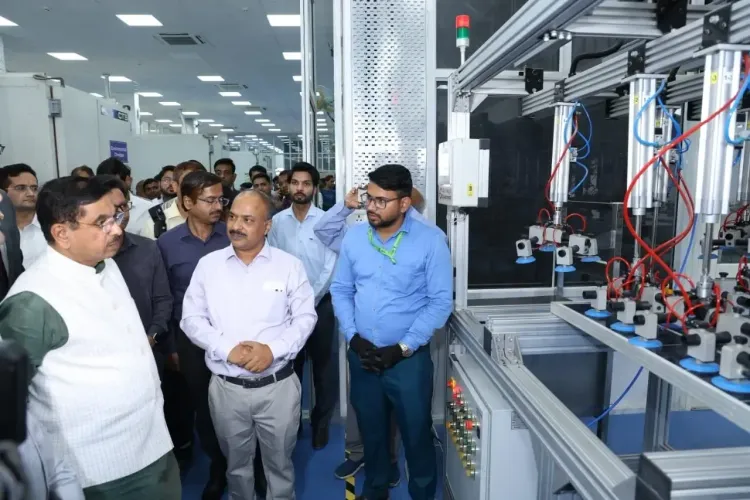Pralhad Joshi Unveils Solar PV Testing Facility to Enhance Green Energy Initiatives

Synopsis
Key Takeaways
- New lab to set global standards
- Enhances solar manufacturing capabilities
- Supports Production-Linked Incentive scheme
- Training hub for professionals
- Focus on advanced solar technologies
New Delhi, April 22 (NationPress) In a significant leap for India’s green energy sector, Union Minister for New and Renewable Energy, Pralhad Joshi, inaugurated the PV Module Testing and Calibration Lab at the National Institute of Solar Energy (NISE) located in Gwal Pahari, Haryana, on the fringes of the national capital.
The Minister remarked that this new lab will establish global benchmarks in solar research and development, testing, training, and policy support, representing a decisive move towards self-reliance, innovation, and global excellence.
Joshi emphasized that NISE is now fully equipped to deliver comprehensive testing, calibration, and certification services, specifically for photovoltaic modules and technologies lacking established standards.
He described the lab as a groundbreaking facility for India and noted that as domestic companies increase production of large modules, this lab will guarantee that their products adhere to the highest quality standards.
Joshi highlighted that the lab is in compliance with BIS standards and will significantly support the Production-Linked Incentive (PLI) scheme, bolstering India's ambition to become a global manufacturing center.
The minister also stressed the role of NISE as a training hub for government officials, industry experts, and international delegates. He commended NISE for training over 55,000 Suryamitra technicians and for installing more than 300 solar air dryer-cum-space heating systems in Leh, which are utilized by farmers to dry apricots.
Such initiatives, he noted, enhance technical capability and promote collaboration among government, industry, and academia. The new facility will allow NISE to significantly elevate its efficiency, quality, and research to meet global standards, he added.
Highlighting the remarkable growth in the renewable energy sector during Prime Minister Narendra Modi’s tenure, the minister reported that India’s installed solar capacity surged from 2.82 GW in 2014 to over 106 GW now, representing an increase of more than 3,700 percent.
In terms of manufacturing, solar module production rose from 2 GW in 2014 to 80 GW, with a goal of reaching 150 GW by 2030. Additionally, he highlighted the achievement of 50 GW in wind energy capacity.
Emphasizing the government’s ambitious objectives, Joshi stated that India is on course to meet the 500 GW non-fossil fuel energy target by 2030, which includes 292 GW of solar energy, as envisioned by the Prime Minister.
The Minister also encouraged NISE to enhance its global research impact and foster patent generation.
He pointed out the necessity for in-depth research, innovation, and global collaboration. He urged NISE to forge partnerships, nurture talent, and expand boundaries so that its work resonates across laboratories, manufacturing units, and solar farms globally.
He acknowledged that NISE is currently engaged in cutting-edge technologies like Perovskite Solar Cells and Bifacial Panels. Looking ahead, he suggested that NISE should launch initiatives for the widespread adoption of innovations such as AI for Solar Power Forecasting, Building-Integrated Photovoltaics (BIPV), and Solar-Driven EV Charging Stations.
He urged NISE to investigate the potential for sustainable EV charging through solar at a large scale.









